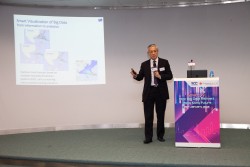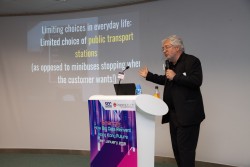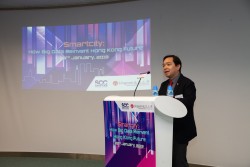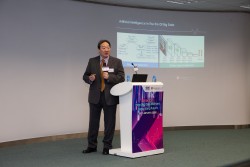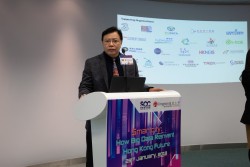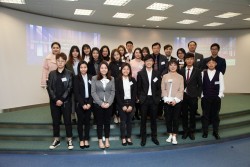Lingnan University’s “Smart City” Conference explores ways to build a smarter Hong Kong

In response to the Government’s call for building a smarter city in the Smart City Blueprint, Lingnan University (LU) and Smart City Consortium (SCC) held the “Smartcity: How Big Data Reinvent Hong Kong Future” Conference on 23 January at the Hong Kong Productivity Council to gather together corporations and the public for a better understanding of the various issues related to big data and the future direction of Hong Kong’s development as a smart city.
The Conference invited senior management from public utilities, infrastructure and innovative technology industries to share their views about the future of big data and a wide range of technological applications. There were representatives from the MTR, HK Electric, Airport Authority, Hospital Authority, Hong Kong Observatory, 3 Hong Kong, Tai Cheung Holdings, Hong Kong Federation of Industries, Hong Kong Chinese Manufacturers Association, Cyberport and so on. Conference participants were able to exchange the latest knowledge and applications on big data in promoting the future development of Hong Kong. The topics covered include big data and medical applications, digitalised transportation, artificial intelligence (AI), cloud systems and electronic commerce.
Hong Kong’s strengths in further strengthening the ties between big data and people’s everyday life in building a smart city
Dr. Winnie Tang, JP, the Founder and Honorary President of SCC stated that due to the robustness of Hong Kong’s legal system, intellectual property right protection and the pool of world-class talents, Hong Kong ranks fourth in Asia in terms of smart city rankings. In the future, Hong Kong can further upgrade its hardware infrastructure. However, the corresponding legal regulations are much in need of strengthening if the development of Hong Kong as a smart city is to be further enhanced.
One of the preconditions for building a smart city is the opening up of data. Dr. Tang said, “One direction for future research is how to bring data aggregation to the next level. At the moment, due to the restrictions of the Telecommunications Ordinance, telecommunication operators cannot open up their data. However, as long as the relevant laws are in place, the opening up of data will make technological applications more readily available to the public. For instance, promoting the City Dashboard and the Centralised Real-Time Geographic Information System—Common Operating Picture can further help Hong Kong move towards Smart City 3.0.”
Mr. Shun Chi-ming, JP, Director of the Hong Kong Observatory said at the Conference, “Some countries have integrated the geographic information and shared it with other parties through the opening up of data in order to achieve a greater accuracy in weather forecasts. In addition, the Observatory is committed to utilising big data to research and develop new applications, such as probabilistic forecasts which provide more comprehensive weather-related information for the public. The Observatory has also developed in-house a number of weather service systems, such as the “MyObservatory” application, provided weather information required in the aircraft cockpits and data related to the detection and alerting of windshear and turbulence.” Through all of these, it can be seen that big data applications can go a long way in making our life better.
Lingnan, a liberal arts university which places lots of emphasis on ploughing back to the community in its research endeavours
Technology is inseparable from life, and LU believes that academic pursuits and social needs should be interconnected. Research should go beyond benefitting the corporate world: people from all walks of life, including the less well-off and the disadvantaged, have to be able to taste the fruits of academic research. Dr. Andreas Matthias, a LU researcher in the Philosophy Department, is interested in the ethical principles behind technological applications. In the Conference, he put forward the view that a humanistic spirit should be embodied in the development of science and technology. In other words, a smart city must not be one in which technology is for the sake of technology, instead the needs of people should be well taken into account.
Promoting gerontechnology in community and improving sustainable development
In the near future, LU will also utilise the resources obtained from the Chief Executive’s Community Project to research the use of gerontechnology in the community as a response to the country’s 13th Five-Year Plan and the Chief Executive’s Policy Agenda. Professor Joshua Mok Ka-ho, the Vice President, said, “Lingnan University has been cultivating smart city talents in Hong Kong through its course offerings and other initiatives. For example, we have launched a Smart Campus “LU Mobile” App and introduced a new undergraduate programme in Data Science in response to the social demands.”
With the nearly $20 million grant from the Chief Executive’s Community Project, LU would promote a range of community research and development projects, such as “Social Innovation and Socialpreneurs: Smart Ageing with Gerontechnology” which is to assist the development of gerontechnology and help young people start their own businesses throughout the 18 districts in Hong Kong. Professor Mok Ka-ho said, “Lingnan University, as a liberal arts university, is working with different institutions to encourage students to develop start-up projects that can serve the society.” By utilising cloud technology, sharing economy and e-commerce innovations, nowadays the risk of starting businesses can be much reduced. In this regard, LU hopes to promote collaborations between social enterprises so as to create a new community ecology and improve the sustainability of our smart city.
Focusing on training diverse talents to achieve knowledge integration and transfer between the middle and lower streams
Regarding the cultivation of talents, undergraduate courses in data applications have already been introduced in a number of universities in Hong Kong. However, according to Professor Wong Man-Leung, Head of the Department of Computing and Decision Sciences, there is still a shortage of such talents. Today, big data has a wide range of applications, such as transportation, economic research, medical treatment and product marketing. Therefore, the demand for talents in data science will definitely increase in future, and the salary and career prospects of graduates are also much promising. Professor Wong pointed out that LU’s data science curriculum draws its strengths from different departments within the University. Besides, students can participate in overseas exchange programmes and work placements as well as obtain professional qualifications in data science through hands-on experiences..
Equally important, Dr. Ho Wing, Associate Director of the Information Technology Services Centre added that LU has launched a strategic development plan in recent years with a view to strengthen the links between academia and industry. In addition to launching courses to enhance students’ information literacy, LU has also cooperated with organisations such as SCC and actively participated in various community projects covering “Waste-to-Energy Recycling”, “Smart Living” and “Community Innovation”, in order to train science and technology talents for the betterment of the society in the long run. Furthermore, as a liberal arts university focusing on humanities and social sciences, LU strives to train students who can use a diverse range of perspectives to look at the current trends in politics, economy and technology. According to Dr. Ho, “Regarding technology, Lingnan University concentrates on developing information integration and social connections in the middle and lower streams, and at the same time it is committed to leading the community in the construction of a smart city. Through this Conference, Lingnan has established a platform for the government, industrial, commercial and research sectors to come together and expand their networks so as to better achieve the goals of knowledge transfer.”
A number of final-year undergraduate students also attended the conference. Some of them served as masters of ceremonies or received the guests of honour. Through the activities, they were able to meet the industry practitioners and members from various sectors of the society, so as to step out of the classroom and learn first-hand the latest developments in the field.
Photo Album


